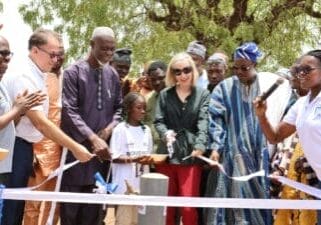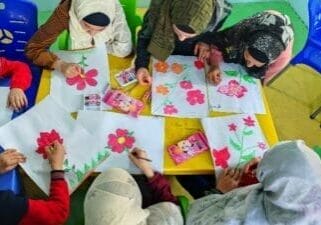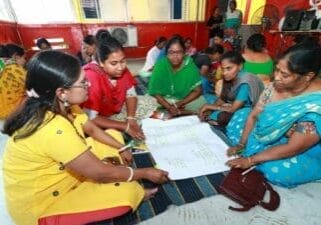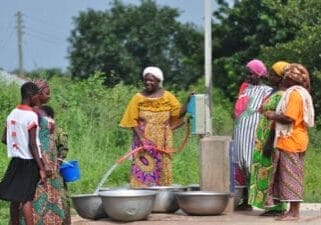News > Blog
Strengthening Economic Opportunities for Women Entrepreneurs through Cooperatives
Published 03/24/2024 by Global Communities

By Ashley Holst
Cooperatives are leaders in promoting inclusive economic growth by providing equitable and accessible solutions to economic and social stressors. Two of the seven principles of cooperatives are “voluntary and open membership” and “concern for community,” both of which call upon cooperatives to create opportunities for all people and to put the betterment of their communities at the forefront. Cooperatives are also a proven avenue for women’s economic advancement, because they provide them with opportunities to become business owners and share in the risks and rewards of entrepreneurship. Through cooperatives women have improved access to training, resources and financial products to grow their businesses and improve their economic wellbeing.
“Initially, I didn’t see self-employment as a viable option for women,” said Judy Boyani, Vision 4 Housing Cooperative secretary. “However, through the business trainings offered by the Vision 4 Housing Cooperative, I’ve not only started my own business but also become a trainer myself. I train other women and girls on essential entrepreneurial skills, from soap making to financial literacy, believing in their potential to greatly contribute to our community.”
Global Communities implements the United States Agency for International Development’s (USAID) Cooperative Development Program called Cooperative Leadership Engagement Advocacy and Research (CLEAR), which coaches cooperatives on successful and sustainable business models. Through cooperative development projects, Global Communities has documented how cooperative membership is empowering women to access economic opportunities and grow their businesses. Since 2018, the CLEAR project has supported 19 worker cooperatives in Kenya through formation and registration and nearly 2,000 women cooperators.
Cooperatives Opening Doors for Women Entrepreneurs
One example of this comes from the Vision 4 Housing cooperative in Kenya. While women in Kenya have the right to own property, strong patriarchal norms mean it is still uncommon for women to inherit or purchase land. However, through membership in the housing cooperative, single and widowed women have greater ability to own land and homes. Lucia, for example, who is a widowed Vision 4 Housing member, has been able to reach her savings goal, purchase a plot of land and build a house for herself and her children. On her plot, she grows vegetables and raises chickens; she also manages a small business out of her home. With a combination of earnings from her business ventures and money that would have been spent on rent, she has purchased another house to use as a rental property.

Cooperatives are opening doors for women entrepreneurs by creating safe and inclusive educational opportunities in traditionally male-dominated industries, such as the energy sector. For example, the Women in Sustainable Energy and Entrepreneurship (WISEe) worker cooperative in Kenya, which has also received support from Global Communities, trains women in solar panel engineering and panel installation. After the training, members are certified through the cooperative, which leads to more employment opportunities than their uncertified peers receive. The cooperative continues supporting members through sourcing installation materials, marketing the products and assigning teams of member engineers to complete installation projects. The WISEe cooperative has created more jobs for women in science, technology, engineering, and math (STEM), and increased job opportunities for their members. WISEe trainings and solar panel services are marketed through social media and mass text messaging campaigns. As a result of these efforts, a recent WISEe training has been sold out and the cooperative has a fully booked schedule.
Beyond the anecdotes from our programs, data shows that 82% of cooperative members in Kenya report directly benefitting from cooperative membership. Women in cooperatives also report having stronger support systems in place for when emergencies occur, since cooperative members tend to turn to each other in times of need.
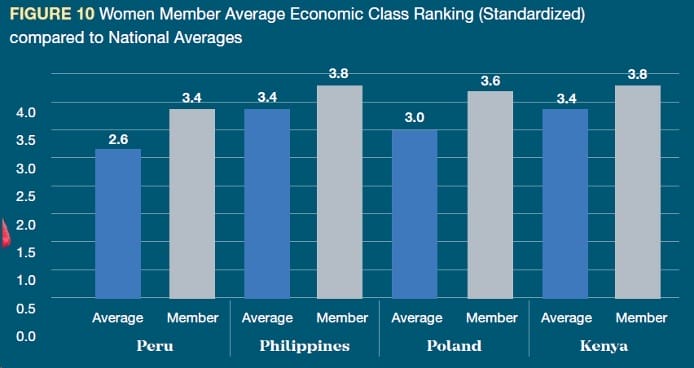
Entrepreneurship, especially for women, can be daunting with many barriers to entry, including limited access to capital and education, and cultural beliefs around women’s work. The cooperative model has supported many women to develop and grow their businesses in new and emerging markets through improved access to finance and solid social and economic safety nets. In many ways, cooperatives are helping women break through cultural barriers and grow as leaders, all while advancing their businesses and securing stronger economic futures. Donors and implementing organizations looking to improve women’s economic opportunities through entrepreneurship should consider the cooperative model as a more inclusive and risk sharing alternative to single entrepreneur-owned businesses.
Building on lessons learned from CLEAR (2018 to 2023), which supported more than 4,000 cooperative members in Kenya, the CLEAR+ project (2023 to 2028), seeks to expand its reach and scale up the worker cooperative model. Our goal is to continue growing economic opportunities for women and youth within the cooperative sectors in Kenya and Guatemala.



